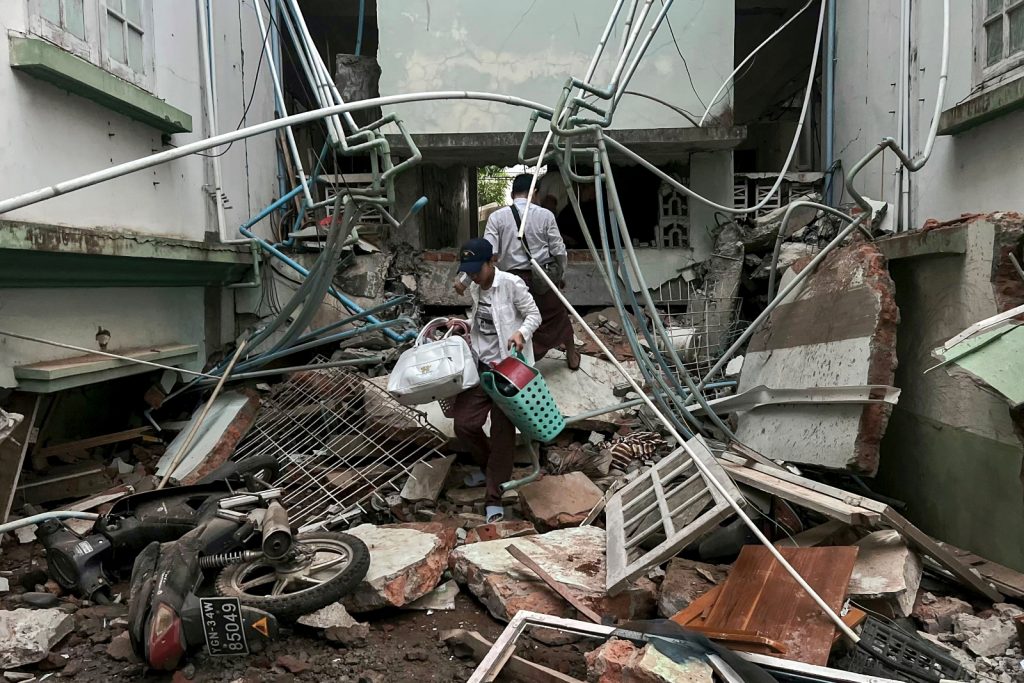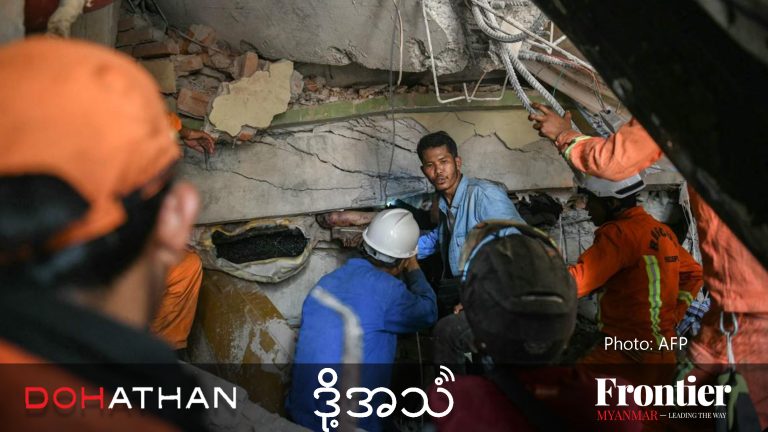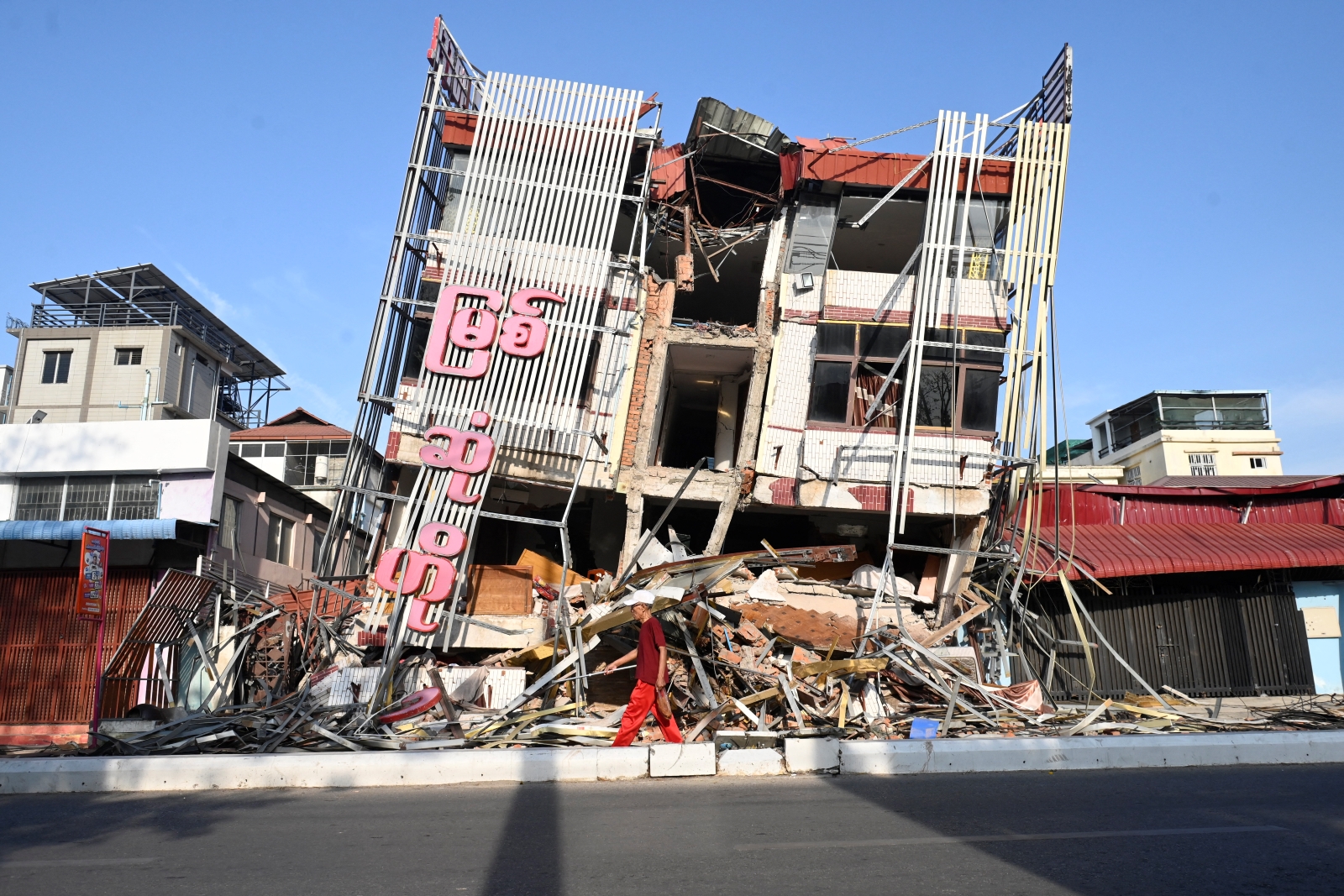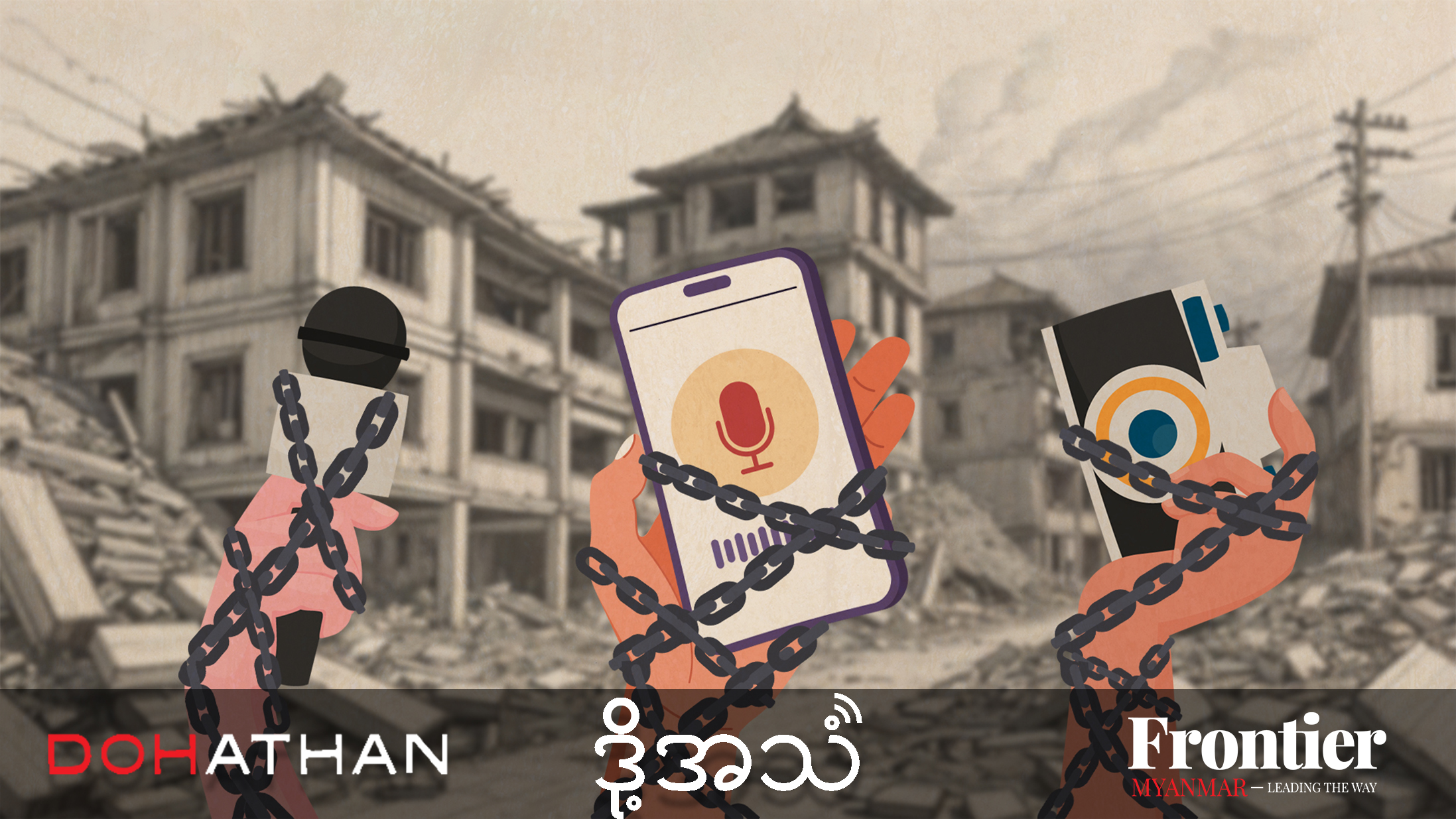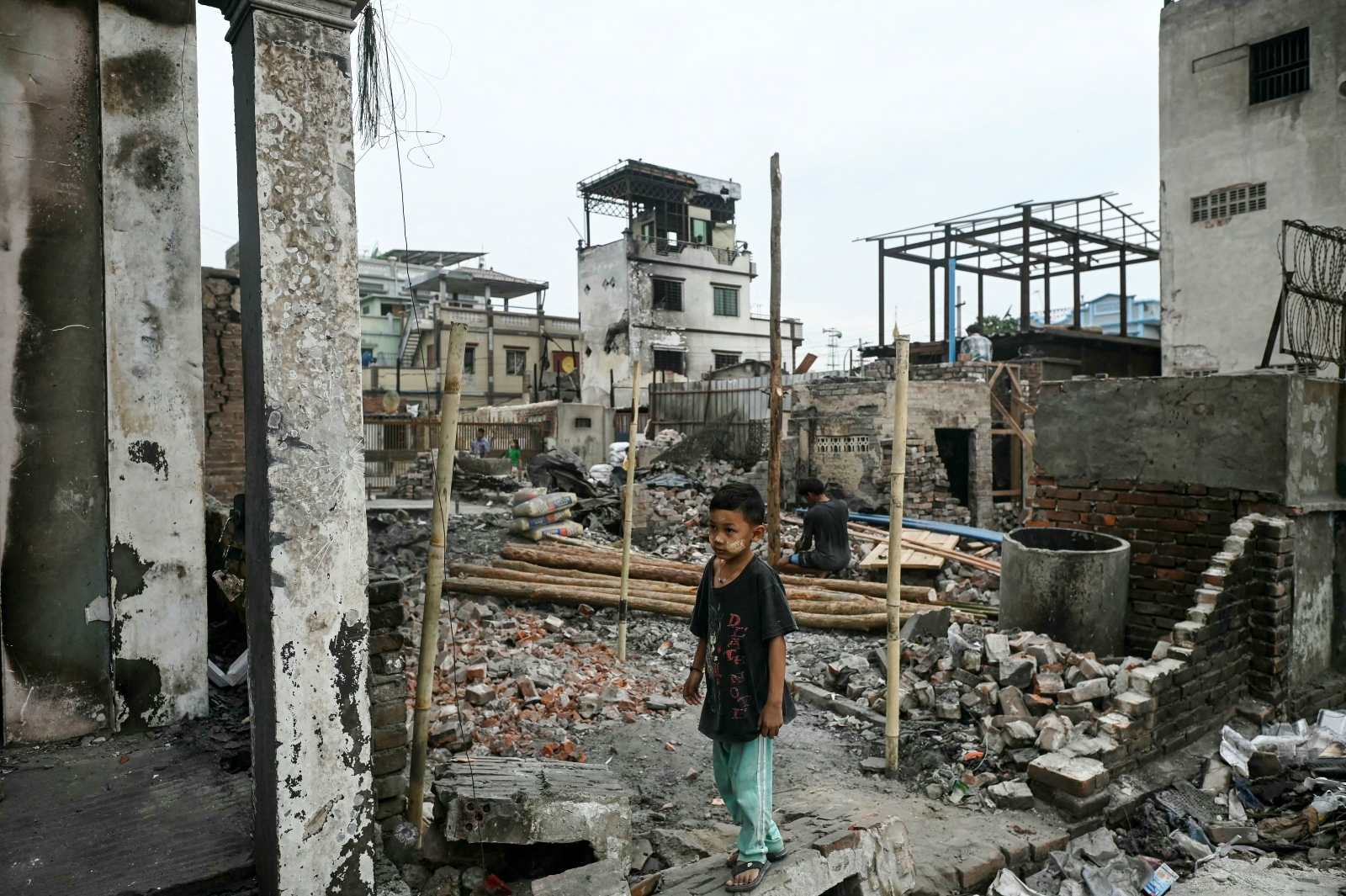The March 28 earthquake rattled Myanmar’s fledgling insurance industry, with companies that offered quake coverage now obligated to pay out massive amounts of compensation in hard-hit Nay Pyi Taw and Mandalay.
By FRONTIER
The 7.7 magnitude Sagaing earthquake caused extensive damage to buildings in large swathes of central Myanmar. Among them was the house of Daw Chaw and her husband in Nay Pyi Taw’s Pobbathiri Township.
While the home escaped severe damage, the quake was strong enough to create cracks in the walls. Fortunately Daw Chaw’s husband, who works as a civil servant, had purchased earthquake insurance when they bought the house.
“We bought our house on an instalment plan, so we had to get insurance,” Daw Chaw, who asked that her real name not be used, told Frontier.
While insurance is intended to provide a safety net in the event of an emergency, Daw Chaw said the process of getting compensation has been fraught with obstacles. The frustration began when the insurance company’s survey team came to inspect the damage and asked when she first noticed the cracks.
“They wanted to know if I first saw the cracks right after the earthquake. If not, they said the damage might not be covered by insurance,” she said. “But how could I see them? After the earthquake we lived outside for nearly a week because no one dared go inside the house.”
An argument ensued, and the insurance company – a joint venture between local and Japanese owners – eventually agreed to pay compensation for the repair costs. However, more than two weeks after the agreement, Daw Chaw said they still had not yet received any money, and therefore had not been able to start the repairs.
Daw Chaw and her husband are far from alone in awaiting compensation. Pro-military news outlet Popular News Journal reported on May 22 that junta-run Myanma Insurance had settled about 50 earthquake claims totalling K4 billion (about US$906,000 at the current market rate) in Mandalay, Nay Pyi Taw and other areas. However, more than 500 additional claims had been filed with the company that were still awaiting settlement.
Ma Mya Lwin, a Mandalay-based insurance agent who spoke to Frontier using a pseudonym, said insurance companies have been taken by surprise at the scale of the crisis. “Insurers in Myanmar have never experienced a single event that required the payment of such a huge amount of compensation,” she said.
She added that insurance companies are burdened not only by the widespread damage to buildings in Mandalay and Nay Pyi Taw, but also by the fact that earthquake insurance also covers damage to vehicles. “Vehicles are included in earthquake coverage, so insurance companies also have to pay for every car affected by the disaster,” Mya Lwin said.
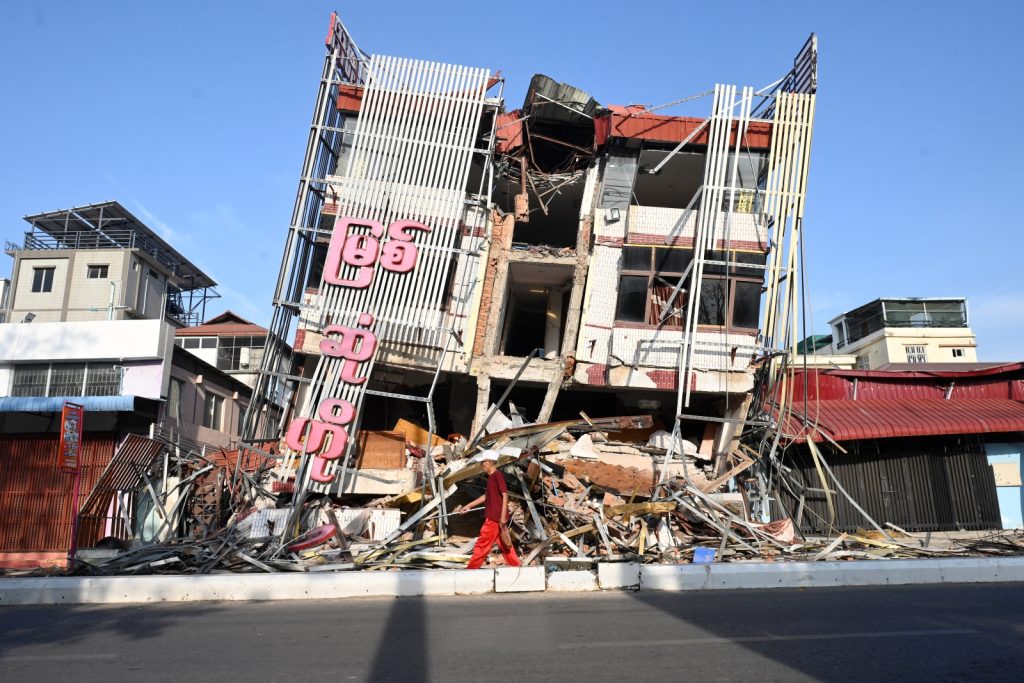
Insurance companies tested
In Myanmar, basic homeowner’s insurance covers fire damage. Other insurances – for earthquakes, floods or other disasters – can only be purchased as add-ons to fire coverage. The premium per year for fire insurance is usually around 0.2 percent of the value of the house, and each add-on increases the rate by 0.1pc of that value.
“Destructive earthquakes aren’t very common in Myanmar, so insurance companies and agents persuaded their clients to add earthquake coverage along with fire insurance because it made the premium payments higher and brought in more money,” Mya Lwin said. She added that most earthquake policies were sold in Mandalay and Nay Pyi Taw – two cities hit hard by the disaster – to affluent people living in single-family homes.
Frontier was unable to verify the total amount of compensation insurance companies must pay due to the earthquake, but a source at AYA Sompo said the company will have to pay out about K6-8 billion. AYA Sompo is a joint venture company 20pc owned by AYA Myanmar General Insurance and 80pc by Japan’s Sompo insurance.
“The company has the resources to pay all the claims,” the source said. However, she added that as a result of the unexpectedly high amount of earthquake compensation the company must pay out, it’s finding other ways to cut costs, such as reducing the incentive bonus it pays to employees for reaching their monthly sales targets from K4.5 million to K1.5 million.
AYA Sompo has also stopped offering earthquake insurance in the wake of the disaster. Frontier reached out to AYA Sompo to ask whether this suspension was temporary or permanent, but the company said it is unable to respond to queries at this time.
The suspension comes even as general interest in earthquake insurance has increased. A staff member at another joint venture insurance company in Yangon said the number of people calling to ask about earthquake insurance has skyrocketed in the past two months.
“Before the earthquake, we’d get maybe one call a day from people asking about insurance of any type,” she said. “But now we’re getting 10 to 15 calls a day from people who want earthquake insurance. When we explain that we stopped selling earthquake coverage, they’re not interested in buying other types of insurance. So, despite getting more calls, overall sales have actually dropped.”
U Aung Moe Thu, an insurance consultant who worked as general manager of two locally owned insurance companies from 2013 to 2022, told Frontier that companies have stopped selling earthquake coverage because the frequent aftershocks are causing additional damage.
“This is a business based on covering unforeseen and accidental events. Insurance companies accept unforeseen risks but not risks that are certain to occur,” he said. “It’s common for big earthquakes to be followed by aftershocks. If they cause more damage, the insurance company needs to pay compensation, so it can be considered a certain risk.”
He added that some companies might start selling earthquake insurance again after the danger from aftershocks abates.
Ko Kyaw, an insurance agent who also requested to change his name, noted that while foreign and joint venture companies have remained solvent since the earthquake, some local companies seem to be struggling.
“When I file insurance claims for our clients, it’s obvious that some local insurance companies are delaying the process and trying hard to find fault with the claims. For example, they ask for a police report when it’s obvious that a car was damaged by the earthquake,” he said.
Getting those reports from government officials has always been an ordeal – due in no small part to pervasive corruption and the frequent need to pay bribes to process paperwork – but in the midst of the post-quake chaos it’s become even harder.
“Insurance payouts depend on documents,” Aung Moe Thu said. “For example, if a car is damaged, a police report is considered essential. If there is a fire, we need reports from the fire department and police. Compensation can be delayed or refused if the information provided in the claim is incomplete.”
He explained that insurance companies in other countries have their own inspection teams, or hire teams from private inspection services when clients file claims, and therefore don’t rely on government reports. He added that the need to get reports from government authorities is one of the reasons more people don’t get insurance in Myanmar.
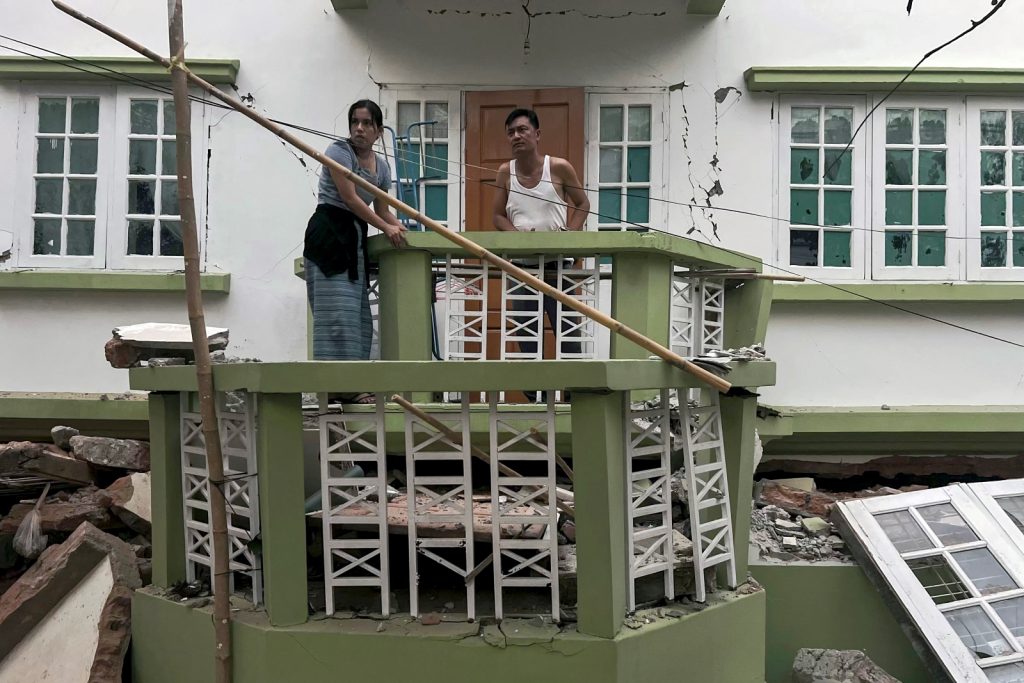
Weak insurance culture
Myanmar’s insurance industry was nationalised in 1959, and for more than 50 years afterward, the government was the sole player in the sector. In 2013 U Thein Sein’s government allowed private domestic companies to enter the market, and in 2019 the National League for Democracy government opened the industry to foreign companies.
In addition to junta-run Myanma Insurance, there are now 26 private insurance companies in Myanmar, 15 of which are locally owned, five are foreign owned, and six are joint ventures between local and foreign owners.
Although the February 2021 military coup resulted in the exodus from Myanmar of foreign companies in many sectors, several international insurance companies have remained in the country, including Chubb from the United States, Manulife from Canada, Prudential from the United Kingdom, Dai-ichi Life and Sompo from Japan, and AIA from Hong Kong.
Mya Lwin said that during the era of the government monopoly, Myanma Insurance failed to educate people about the benefits of getting insurance. “The government operated the industry for a long time, and aside from most people being too poor to afford it, they weren’t interested in insurance because they didn’t know about it or trust the government,” she said.
The sector began slowly improving after private companies entered the market in 2013, but most people still didn’t understand why they should buy insurance, Aung Moe Thu said.
“Private companies prioritised making money by selling premiums. They didn’t dedicate much time to spreading awareness. From the public’s perspective, they started hearing about insurance but they didn’t understand the benefits,” he said.
Further improvements were made when foreign companies entered the market, but the industry was still struggling to develop when the military coup occurred. Like many things in Myanmar, it’s been regressing ever since.
“The insurance industry has been affected by current events and by the junta’s failed administrative system. There are now fewer insured people than there were before 2021,” Aung Moe Thu said. “Most people in Myanmar still don’t consider insurance to be a basic necessity. Only those who have extra money can buy it. If incomes fall, the insurance industry will also fall.”
Aung Moe Thu said the earthquake is a big test for insurance companies and agents, and those that respond well will gain good reputations in the industry.
“Before the earthquake, the companies mostly dealt with car accidents, and when it came to disasters, they mostly dealt with fires. This is the first time they’ve had to deal with such a large number of cases at the same time,” he said.
“But no one needs to worry about whether insurance companies can pay compensation or whether they’ll go bankrupt, because an insurance company’s minimum capital requirement is K40 billion. With the premiums customers have been paying, there’s no reason the companies can’t pay compensation.”


